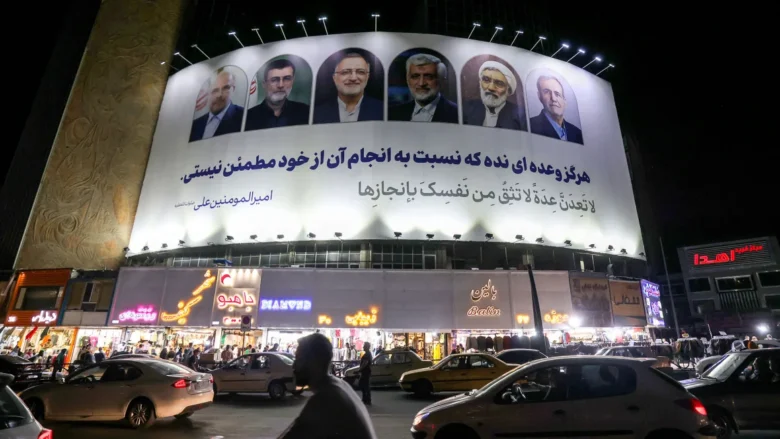People in Iran went to the polls on Friday for what could be the most important presidential elections for the country in decades, even though there was a chance of war with Israel, the economy was hurting, and there was social unrest.
President Ebrahim Raisi, Foreign Minister Hossein Amir-Abdollahian, and other officials died suddenly in a chopper crash not long ago. This has left a leadership gap. Many people thought that Raisi, a staunch supporter of the government, would be a strong choice to replace Iran’s 85-year-old Supreme Leader, Ayatollah Ali Khamenei, who is in charge of everything the country does.
Also, this is the first presidential election since Mahsa Amini died in the care of the country’s renowned morality police in 2022. That death led to the biggest protests against the government since it began in 1979. Relations with the West are getting worse, Iran’s nuclear program is moving forward, and the chance of direct war with Israel is growing. Iran and Israel fired at each other for the first time just two months ago as the war in Gaza got worse. Now, Israel is getting ready for a possible second front with Hezbollah in Lebanon, which is Iran’s main regional ally.
After dozens of other candidates were turned down, there are now three conservatives and one liberal running for the country’s top chosen position. To win the first round of elections, most people think that Masoud Pezeshkian, 69, a reformist lawmaker and former health minister, Saeed Jalili, a hardline security adviser and nuclear negotiator, and Mohammad Bagher Ghalibaf, the conservative speaker of the Iranian parliament, will win. Iran’s Guardian Council, which answers directly to Khamenei, chose the final candidates ahead of time.
Polls show that Pezeshkian is becoming more popular, while the rest of the Republicans are split in their support. During protests across the country against Amini’s death in 2022, Pezeshkian told Iran’s IRINN TV, “It is our fault.” We want to be holy and use force to make that happen. The facts say that this can’t happen.
Two conservative candidates, Amirhossein Qazizadeh-Hashemi and Alireza Zakani, dropped out of the race on Thursday to help the extreme vote become stronger. To make sure a hardliner win, Qazizadeh-Hashemi told other candidates from the “revolution camp” to do the same.
If more than half of the voters choose someone other than the winner in the first round, that person will be chosen president. If not, the two top candidates will compete in a second round a week later.
Arash Azizi, an Iranian writer and fellow at the Center for Middle East and Global Order (CMEG), a Berlin-based think tank, said, “These are not free and fair elections at all. Only people who have sworn utter loyalty to Khamenei and the Islamic Republic can run.” “But the three main candidates are still very different in important ways.” These all cause Khamenei some trouble in different ways.
The top candidates are children of Iran’s Islamic Revolution in 1979. They were probably shaped by their time fighting the US-backed Saddam Hussein regime in the bloody, 10-year war with their neighbor Iraq and their time working for the Iranian government.
People will choose a different road for the country if they vote for either the conservatives or their progressive running mate.
“What we have seen in this election compared to the last one (in 2021) is that there has been some energy for the election in the last couple of days,” Trita Parsi, an Iran expert based in Washington, D.C., and executive vice president of the Quincy Institute said, suggesting that more people may vote than in previous elections.
Lately, voter apathy has harmed the Iranian election process, which is embarrassing for the establishment, which has counted on high voter turnout to show that it is fair and popular.
The lowest number of people turned out to vote in March elections for the parliament and the Assembly of Experts, which is in charge of choosing the Supreme Leader’s replacement. This happened despite efforts by the government to get people excited about the elections before they happened.
After getting his vote in on Friday morning, Khamenei told everyone in Iran to go to the polls and cast their ballots.
“People’s participation is an important part of the state. The Islamic Republic’s status in the world and its ability to stay in power depend on people’s participation,” he said.
Even though there is some support, Sina Toossi, an Iran expert and senior fellow at the Center for International Policy in Washington, DC, said that low voter turnout “remains a distinct possibility,” due to widespread disillusionment and economic difficulties.
“People in Iran need simple things”
There was a happy vibe at Tehran’s Shiroudi stadium on Wednesday, where conservative Ghalibaf fans were gathering for his last campaign event.
A lot of Iranians crowded into the indoor venue and chanted, “We salute Raisi, we say hello to Ghalibaf” as the candidate walked in.
“Ghalibaf is the group that backs the Supreme Leader and follows him.” The 32-year-old preacher Ahmad said in the crowd, “Whatever the Supreme Leader says, he does.” People in Iran who talked to CNN only agreed to give their first names so that they could be honest.
A lot of people are most worried about the economy.
In June, Iran’s inflation rate was 36.1%, which made things hard for people all over the country. The country’s yearly inflation rate hasn’t been below 30% in over five years, even though it dropped from over 45% last year. After the Trump administration pulled out of the 2015 nuclear deal and put heavy penalties back on the Islamic Republic, inflation has been staying high.
“A little bit of hope”
As night fell, Pezeshkian fans met at the nearby Heidarnia stadium to hear him talk. Many of them were interested in making Iran’s relationships with other countries better.
Mariam, 23, told CNN, “The change we need in politics is in foreign policy so that people’s economic situations will get better.” She also said that voting for a conservative would be like voting for the late President Raisi, who she said broke promises and didn’t control Iran’s notorious morals police.
The crowd around her was tense, and there was a sense of urgency in the stadium. An hour before, the event was supposed to happen, but organizers suddenly called it off, and cops stopped the gate.



